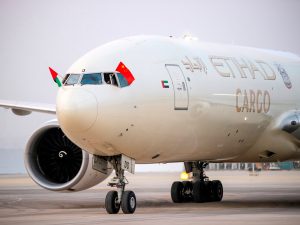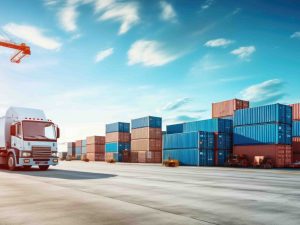Etihad Cargo has signed an agreement with LODD Autonomous, a leader in advanced air mobility and autonomous logistics, to explore the integration of next-generation ‘Hili’ hybrid VTOL (Vertical Take-Off and Landing) aircraft into its UAE operations. This collaboration aims to complement Etihad Cargo’s conventional fleet with agile, short-range capacity that enhances operational resilience, speeds up delivery times, and supports more sustainable logistics through reduced emissions. With a payload capacity of 250 kilograms and a range exceeding 700 kilometres, the Hili aircraft offers an ideal balance of capacity and agility, making it well-suited for transporting high-value shipments across diverse terrains and conditions. The new partnership will focus on experimental operations to evaluate the efficiency, safety, and ground logistics compatibility of LODD Autonomous’ flagship drone for point-to-point transfers across the UAE. The potential impact on logistics is significant, as Hili aircraft eliminate the need for runways and traditional airport infrastructure—cutting delivery times by hours or even days. As part of the trial, Etihad Cargo will also assess the operational and commercial feasibility of integrating Hili aircraft into its future fleet, further reinforcing its commitment to innovation, sustainability, and next-generation logistics solutions.
Read More »Kaushalya Logistics opens three new depots in UP
Kaushalya Logistics has commenced operations at three new depots in Uttar Pradesh — Fatehpur (Choudagra), Unnao (Radhaganj) and Balia (Rasara) for J K Cement under the CFA model. The new facilities are expected to handle a combined monthly volume of approximately 3,000 MT, significantly enhancing the company’s regional capacity and operational efficiency. This strategic expansion further deepens Kaushalya Logistics’ long-standing partnership with J K Cement and underscores its commitment to strengthening the cement major’s distribution network across high-growth markets in northern India.
Read More »ACAAI to deepen industry-govt dialogue
With only a day left for the 49th ACAAI convention to begin in Bali from 6-9 November, Samir J. Shah, President of ACAAI, shared, “We will increase our interaction with the Government and other stakeholders. A continual dialogue will benefit all of us. We also propose to bring out a few white papers on topics of current interest. ACAAI will also be working towards setting up its own training institute to train personnel of our member organisations on all related topics, in addition to DG regulations.”
Read More »Delhi Cargo wins best cargo terminal award @ICA
GMR Airports Limited–Delhi Cargo Terminal has been presented with the South Asia’s Best Cargo Terminal Award at the India Cargo Awards 2025. This recognition highlights GMR’s excellence in cargo operations, innovation, and commitment to efficiency and customer satisfaction. The Delhi Cargo Terminal continues to set new benchmarks in logistics and air cargo infra, reinforcing its position as a leading hub in South Asia’s cargo network.
Read More »DP World ICTT, CoPA sign pact to boost maritime infra
The DP World operated International Container Transshipment Terminal (ICTT) MoU with the Cochin Port Authority (CoPA) to enhance the terminal’s cargo handling infra. Under the pact, both parties will collaborate to develop advanced cargo handling facilities at Cochin Port, aligned with Maritime Amrit Kaal Vision 2047. This includes enhancing marine infrastructure to support future vessel requirements at DP World’s Terminal at Cochin, with support from the Union government.
Read More »Allcargo Logistics’ supply chain biz demerges into Allcargo Global
Allcargo Logistics announced that its Composite Scheme of Arrangement involving the demerger of its International Supply Chain (ISC) business and the merger of its Domestic Supply Chain business has become effective from 1 November. The scheme received approval from the National Company Law Tribunal (NCLT), Mumbai Bench, through an order dated 10 October. As part of this restructuring, Allcargo Logistics has demerged its ISC business into a newly incorporated entity Allcargo Global. Following the demerger, the domestic express distribution and consultative logistics businesses will be merged into the resulting Allcargo Logistics, aligning operations for enhanced synergy and value creation.
Read More »DTDC opens new warehouse in Indore
DTDC Express launched its all-women-operated dark store in Indore, Madhya Pradesh. The new facility spans 700 sqft. It is entirely staffed and managed by women who oversee a range of functions, including warehouse operations, last-mile delivery, cash-on-delivery collections, and client servicing. Scalable and designed to fulfil a variety of client-specific needs from deliveries within two to six hours, the Indore Dark Store is part of DTDC’s rapid commerce service, known as Raftaar. It combines advanced warehouse management technology with a highly trained all-women workforce. Prior to launch, the team underwent comprehensive training on DTDC’s Warehouse Management System (WMS), Last-Mile Delivery App, and rapid commerce protocols, ensuring they are equipped to deliver the speed and precision that modern e-commerce demands.
Read More »‘Effective partnerships between public & private sectors can transform logistics efficiency”
Sunil Kohli, MD, Rahat Cargo said, “Public–private collaboration is combining the public sector’s regulatory authority with the private sector’s finances, innovation and operational expertise which may lead to effective partnerships yielding the fruitful outcomes such as developing the infrastructures to meet the commercial needs to reduce bottlenecks with lower costs based on the inputs from logistics providers, freight forwarders, regulatory authorities and the carriers.”
Read More »‘Private players can contribute expertise in automation & cold chain development’
Vikram Kumar, VP, ACAAI said, “Reducing trade friction and enhancing logistics efficiency demand robust public–private collaboration focused on digital, infrastructural, and policy alignment. Government agencies and industry players must jointly advance digital integration through initiatives like the National Logistics Portal (NLP), Paperless Customs, and single-window clearance systems to streamline cargo movement. Public investment should prioritise multimodal and air cargo transshipment hubs at key airports such as Delhi, Mumbai, and upcoming locations like Hyderabad and Bengaluru— allowing India to serve as a regional trade gateway. Private players can contribute expertise in automation, cold-chain development, and digital freight management to optimise these hubs. Regular policy–industry dialogues are essential to harmonise customs procedures, international regulations, taxation and sustainability goals. Coupled with skill development programs and performance-linked incentives, such coordinated action can transform India’s logistics ecosystem into a digitally connected, efficient, and globally competitive transshipment hub.”
Read More »‘Joint initiatives in data sharing, single window system can cut delays & costs’
C K Govil, CMD, Activair Airfreight India said, “Reducing trade friction and enhancing logistics efficiency demand a strong, structured public–private collaboration built on trust, transparency, and shared goals. Governments must work closely with industry stakeholders to streamline customs procedures, harmonise regulatory frameworks, and promote paperless trade through digital integration. Public agencies can support infrastructure modernisation—developing multimodal logistics parks, air cargo hubs, and efficient last-mile connectivity—while private players contribute through technology, innovation, and operational expertise. Joint initiatives in data sharing, single-window clearance systems, and predictive analytics can significantly cut delays and costs. Equally important is creating policy forums and advisory councils where industry associations like ACAAI can represent the voice of the trade community, ensuring policies are practical and forward-looking. A well-coordinated public–private partnership can thus transform the logistics ecosystem into one that is more transparent, efficient, and resilient, enabling seamless global trade despite rising barriers.”
Read More » Cargo Breaking News
Cargo Breaking News









